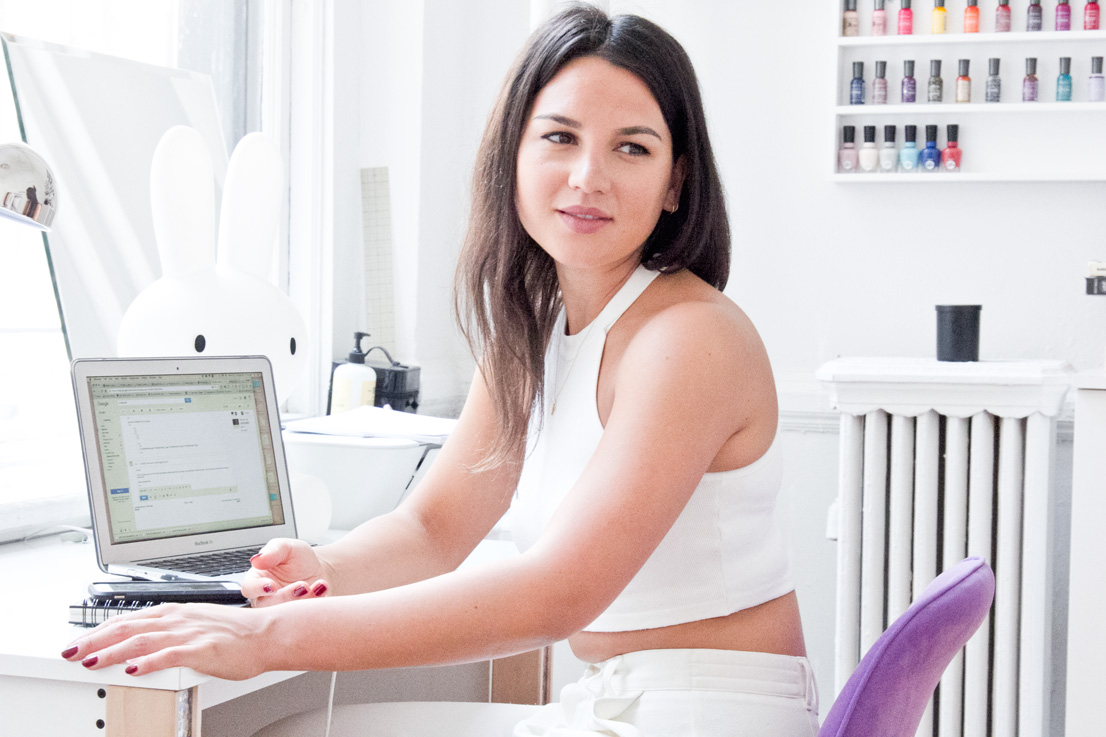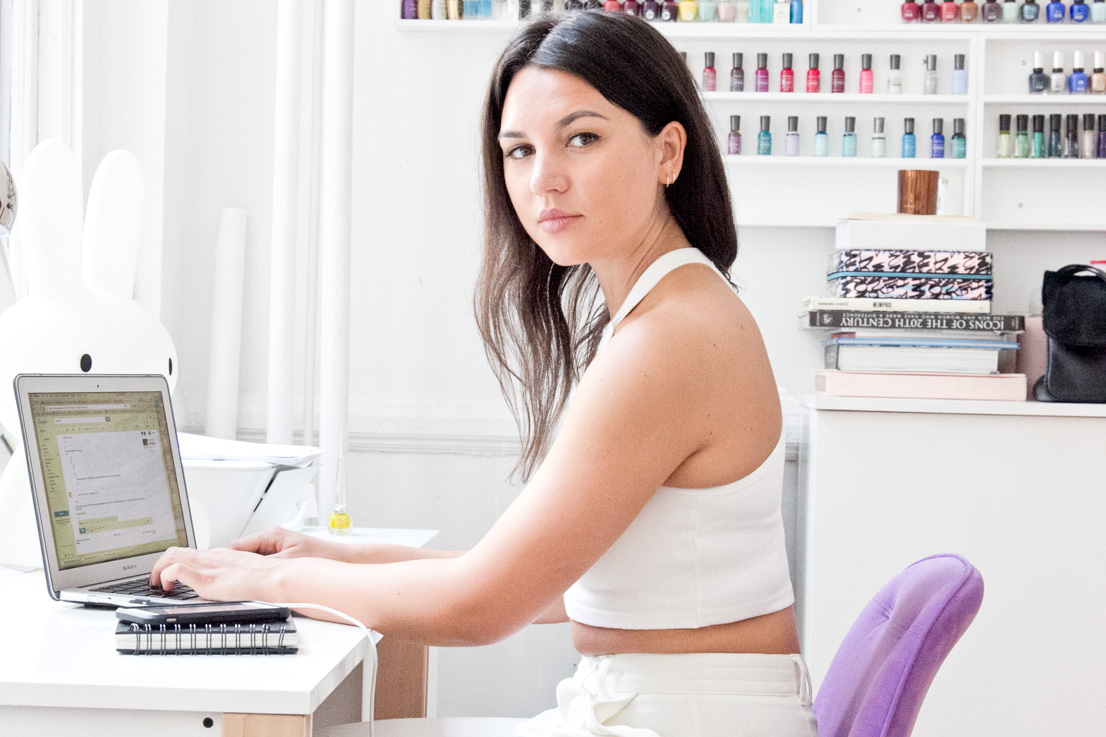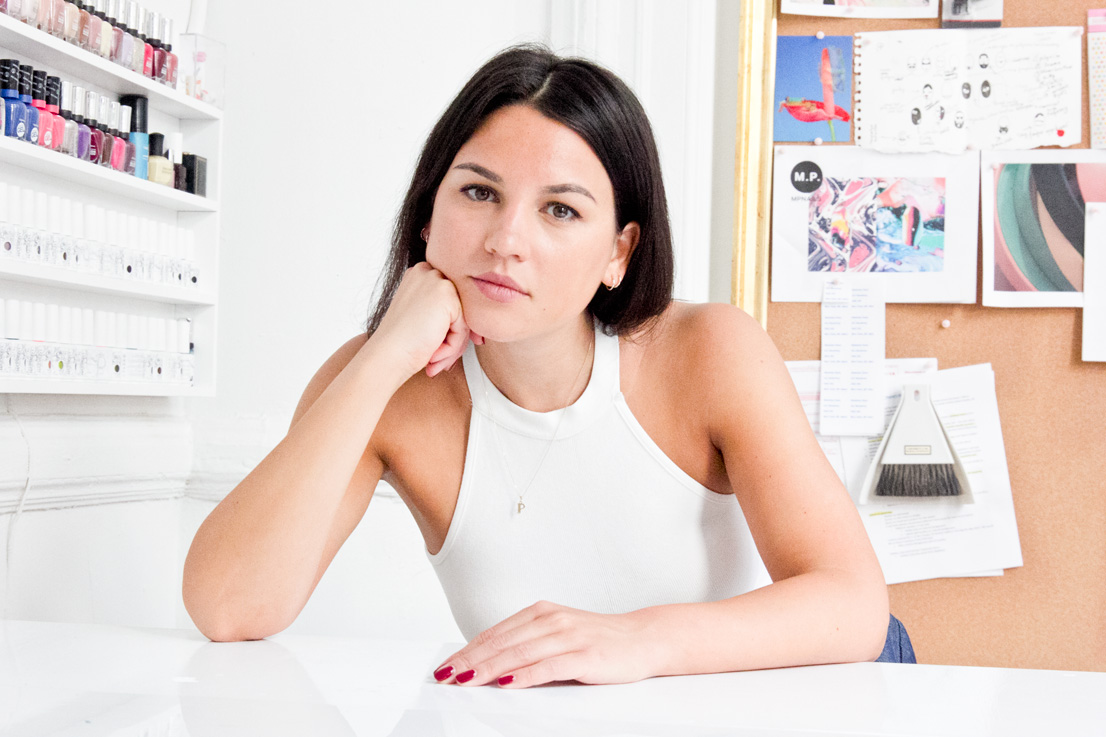I knew Phoebe Lovatt long before we met for the first time at her office in downtown New York back in April. By ‘know’ I mean I was well acquainted with her work, of course. She’s pretty much been writing professional from the moment she graduated at 21, lending her skills to the likes of Dazed & Confused, GQ, ELLE UK and Mr Porter. Her first job was managing the editorial voice of Soho House’s publication, House Seven (you know, casual) and she’s gone on to interview everyone from Anjelica Houston and Diane von Furstenberg to Nicki Minaj and Travis Scott.
Oh, and last year she started The WW Club, which brings together working in the fashion and wider creative industry. It started off as a pop-up co-work and event space in downtown LA, born from frustration about struggling to find a place to meet and work with likeminded women. It also coincided with the launched of the book she wrote, The Handbook for Women Who Do Creative Work, which serves a guide for those same women. Today she hosts career-focuses panel discussions and events in places like London, Paris, New York, and most recently Taipei. The rest, as they say, is history.
To say she’s accomplished then is an understatement. But what strikes you the moment you meet her is just how relatable she is. Catching up in her office feels less like we’re meeting someone who makes us question what we’ve been doing with our lives for the last decade, and more like we’re talking to a friend – someone who grapples with the same hang ups as we do but who also happens to get over it and, well, make shit happen. Phoebe has become that rarest of things: a businesswoman who truly inspires and a patron saint of badass #girlbosses everywhere. Ahead, her thoroughly inspiring take on why it’s important to jump right in (even when you don’t feel ‘ready’) and why it’s never been a more exciting time to be a working woman.
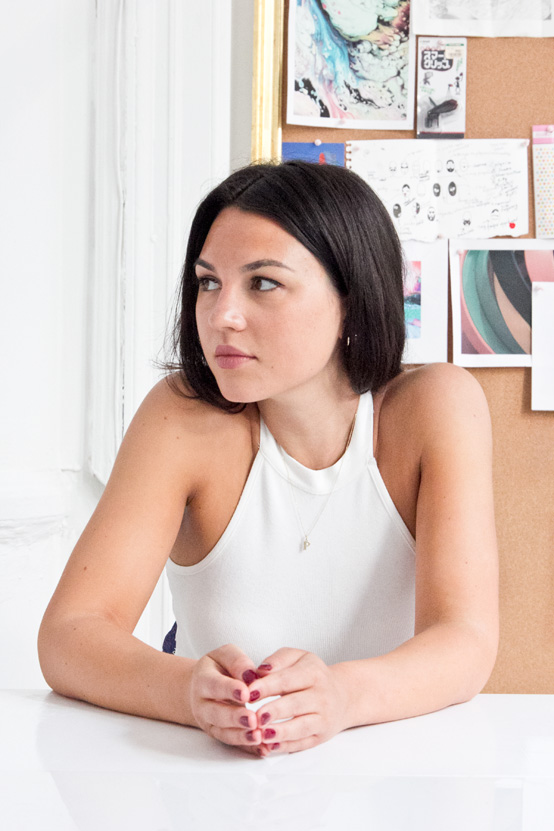 ON GOING THE ACADEMIC ROUTE: I chose History over something ‘vocational’ simply because I’d loved studying it at school and wanted to develop my knowledge – specifically of modern American political and cultural history – further I’m so glad I did. UCL is a fantastic university and the History department there is particularly strong. Doing a degree there taught me to check my sources rigorously, write succinctly, and generally to think in a much more expansive way – all great foundations for my career in journalism. Studying history certainly taught me to zoom out to seek overarching narratives – something that has helped me immensely in my work both as a journalist and a moderator. Whether you’re writing a profile or trying to keep a panel conversation on track, it’s essential to be able to keep the bigger picture in mind and make sure you’re always getting to the point!
ON GOING THE ACADEMIC ROUTE: I chose History over something ‘vocational’ simply because I’d loved studying it at school and wanted to develop my knowledge – specifically of modern American political and cultural history – further I’m so glad I did. UCL is a fantastic university and the History department there is particularly strong. Doing a degree there taught me to check my sources rigorously, write succinctly, and generally to think in a much more expansive way – all great foundations for my career in journalism. Studying history certainly taught me to zoom out to seek overarching narratives – something that has helped me immensely in my work both as a journalist and a moderator. Whether you’re writing a profile or trying to keep a panel conversation on track, it’s essential to be able to keep the bigger picture in mind and make sure you’re always getting to the point!
HOW SHE GOT HER FIRST JOB: I became a member of Soho House in my early twenties and, funnily enough, met the then-editor of its in-house magazine (House) at a Club event. I ended up doing some writing for him and he referred me for an interview when the digital editor’s position came up. Looking back, it was a huge amount of responsibility – I was the founding editor of House Seven, the digital portal for all members, as well as the group-wide copywriter – but when you’re 23 you just think: “Cool”. Or at least I did! Of course, I learnt so much and am immensely grateful that I was trusted to take on the role. I got to shape the editorial tone and voice of House Seven from the very beginning. It’s lovely to look at the site now and still see so many of my original ideas still in place.
ON DEVELOPING A VOICE: Obviously Soho House was already a world-renowned brand by the time I came on board so the broader tone had already been established – the challenge was ‘editorialising’ that voice for a new digital platform. Luckily both Nick Jones (Soho House’s founder) and Justin Quirk (then-editor of House magazine) were very hands-on in ensuring the consistency of the voice across the board, so I always knew when I was getting it right (or occasionally, wrong!) A lot of it was just down to having an intrinsic feel for the brand and its membership base, perhaps because I had been a member myself for a little while.
ON NATURALLY VENTURING INTO FREELANCE LIFE: I’d been interning at magazines since my early teens and working as a freelance journalist since my university days, so luckily I already had a lot of contacts in the media industry. Both my parents are self-employed so I suppose I’ve always seen it as the most natural way of working, even if it’s a way of life that’s plagued with financial stress! Mostly I was galvanised by the fact that I’d recently gotten a Green Card and knew I was going to live in Los Angeles, where I wanted to work as a freelance journalist again.
CUTTING THROUGH THE FLUFF WHEN INTERVIEWING CELEBRITIES: It’s tricky – a lot of journalists would say impossible – to write anything insightful about someone who you’re likely only going to have an hour with, and who probably isn’t that interested in sharing any of the intimate details of their lives. To which I think: fair enough. Like anything, you just get better with practice – at this point I’ve interviewed hundreds of people, famous and not famous, and so I’m hopefully a little bit better at conducting an interesting conversation. And that’s exactly how I see interviews: as conversations, rather than interrogations – which helps I think.
ON WHAT KICK STARTED THE WORKING WOMEN’S CLUB: After a couple of years working as a freelance writer in L.A. I felt in need of a new creative challenge. I was getting a lot of emails from young women asking how I’d managed to find work as a journalist, how I’d met work contacts in L.A. etc, and so I decided to distil some of the information I had into a short book of advice. I called it The Handbook For Women Who Do Creative Work partly because it was a concise career guide, but also because it fits in the palm of your hand! The launch for the book in downtown L.A. was also the start of The WW Club. I launched it in January 2015 with a custom-built pop-up co-work and event space in downtown L.A. There were desks and lamps, free coffee and wifi, and a programme of career-focused events. I also sold the first copies of The Handbook, alongside a selection of work from local women writers and publishers. I had no idea what kind of reception I’d get, but the response was overwhelming: the space was packed for the entire week it was open.
[show_shopthepost_widget id=”1751931″]
THE IDEA BEHIND IT ALL: It’s a tongue-in-cheek nod to the working men’s clubs, which used to be all over the UK. Those clubs were spaces where working men could get together after work to listen to a speech, have a drink, or maybe take a course, and I really liked that idea of combining the educational and the recreational. At the time I started the Club, I was really missing the creative network I was lucky enough to be part of in London, and I wanted to cultivate that spirit of creativity and collaboration in L.A., where I was struggling to find a similar support system. Since launching, I’ve hosted events all over the world; everything from panel conversations, to mentor sessions, to yoga classes, to dinner parties! I also produce lots of content – a blog, a podcast, a newsletter – and occasionally work with brands to produce events. With all these ventures, the mission is simply to provide information, inspiration, support (and hopefully, really enjoyable experiences) for women who want to make sh*t happen.
It’s a really exciting time to be a working woman: support networks are proliferating, women are taking visible leadership positions around the world, and there’s a general spirit of optimism and empowerment that’s really exciting. Hopefully in five years that energy will have translated to tangible economic and professional advancement for women everywhere. I’m certainly going to try to do my part.
ON CHOOSING WHO TO HAVE ON HER PANELS: I like to try to ensure that there’s a broad range of voices and perspectives. With any panel, some people will be super-chatty and others need a little bit more encouragement to speak, so it’s important to be mindful of the personality balance, too. As the moderator, it’s my job to ensure that people are well-briefed on the subject matter, and feel comfortable with the questions – everything usually flows pretty easily from there. I’ve interviewed so many amazing women that it’s hard to narrow down one person who’s stood out among the rest, but recently I had the opportunity to interview Karen Wong, Deputy Director of New York’s New Museum, for the second time. She’s a very inspiring woman: full of energy and bright ideas, and so generous in her willingness to share both for the benefit of other women.
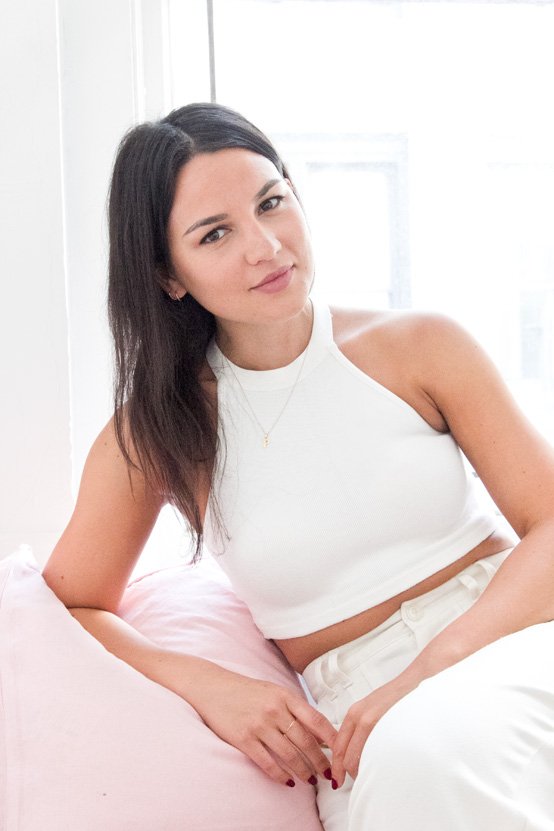 ON PACKING UP AND MOVING TO L.A & THE IMPORTANCE OF HAVING A COMMUNITY: London is very much my hometown, and I feel a deep-rooted sense of connectedness to it even though I haven’t lived there for four years now. Equally, I love to travel and would describe myself as quite nomadic and adventurous by nature. By the time I was 24, it felt like time for a new challenge, and L.A. was it. I’d only been there once before I decided to move there and basically knew no-one, but I thought it would be a good (if slightly awkward!) place to figure some stuff out. Luckily, my hunch was correct. The experience of living in L.A. without the creative network I’d grown up as part of in London gave me an insight into what it might be like to embark on your career without knowing the people and things you need to know. Both The Handbook and The WW Club were inspired by that sense of frustration. Every cloud, as they say. Now I’m based in New York, and I’m very happy here. It’s a crazy city, but an amazing one. I’m glad I waited till this point to move here: I feel like I appreciate it much more than I might’ve before.
ON PACKING UP AND MOVING TO L.A & THE IMPORTANCE OF HAVING A COMMUNITY: London is very much my hometown, and I feel a deep-rooted sense of connectedness to it even though I haven’t lived there for four years now. Equally, I love to travel and would describe myself as quite nomadic and adventurous by nature. By the time I was 24, it felt like time for a new challenge, and L.A. was it. I’d only been there once before I decided to move there and basically knew no-one, but I thought it would be a good (if slightly awkward!) place to figure some stuff out. Luckily, my hunch was correct. The experience of living in L.A. without the creative network I’d grown up as part of in London gave me an insight into what it might be like to embark on your career without knowing the people and things you need to know. Both The Handbook and The WW Club were inspired by that sense of frustration. Every cloud, as they say. Now I’m based in New York, and I’m very happy here. It’s a crazy city, but an amazing one. I’m glad I waited till this point to move here: I feel like I appreciate it much more than I might’ve before.
ON DISCOMFORT LEADING TO GREAT THINGS: I’ve tried to psychoanalyse myself many times, but I can’t really explain why I’m driven by challenges in the way that I am. Perhaps it’s to do with being an only child. I’m very comfortable with doing things alone, in my own way. That emboldens me when it comes to making so-called ‘risky’ decisions, I think. I’m a fairly confident person and luckily my job enables me to meet interesting new people all the time. Having said that, the logistical reality of L.A. (it’s a huge, sprawling city and most people move around it in their cars) presents a challenge to even the most sociable of humans. Ultimately, I think I was able to build a network by doing my small part to alleviate that problem, rather than just giving up and walking away. People respond to authentic, community-driven initiatives and generally want to support them (and their founders!).
FOLLOWING YOUR INSTINCT: At this point I have to say I’ve received so much amazing advice; both from my parents and all the inspiring people I’ve interviewed. If anything it’s made me realise that ultimately you really need to trust your own opinion above all. Be kind to yourself, and have faith in your own decision-making. You’re almost certainly doing better than you think.
WHAT’S NEXT: I have ten millions ideas for The WW Club – the challenge is enacting them in an orderly fashion, rather than all at once (something I’m definitely guilty of)! I don’t really believe in five-year plans but I do hope that the next era of The WW Club will see the continued growth of the community worldwide, both through the online platform and real-life events. It’s a really exciting time to be a working woman: support networks are proliferating, women are taking visible leadership positions around the world, and there’s a general spirit of optimism and empowerment that’s really exciting. Hopefully in five years that energy will have translated to tangible economic and professional advancement for women everywhere. I’m certainly going to try to do my part.

